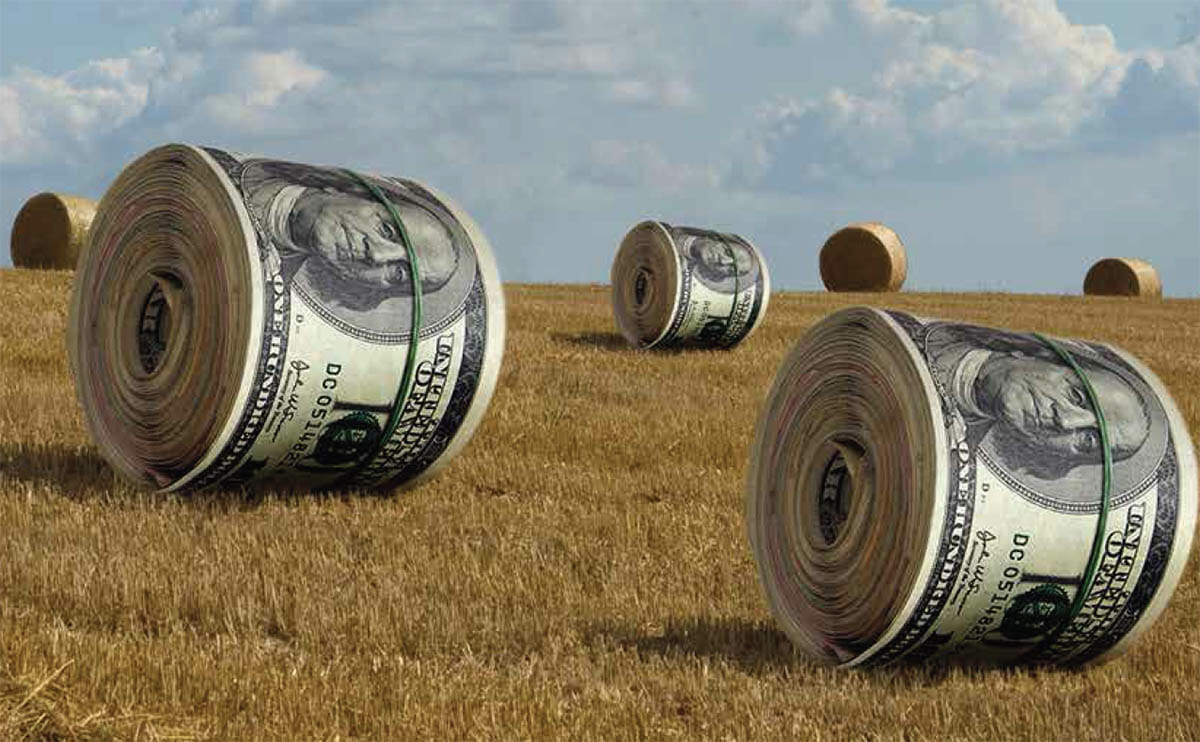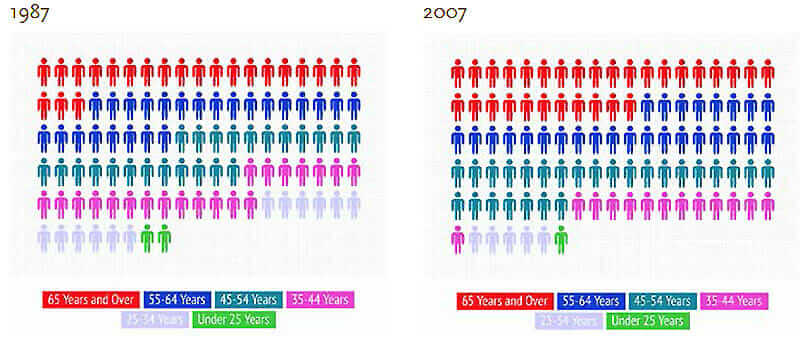Is Wall Street Eyeing America’s Farmland?
A new report says that Wall St. investors could take a chomp out of American farmland. But should farmers (and eaters) be worried?
Is Wall Street Eyeing America’s Farmland?
A new report says that Wall St. investors could take a chomp out of American farmland. But should farmers (and eaters) be worried?

“If they succeed in consolidating control over our land and infrastructure, this new class of land barons could imperil our nation’s food supply,” says Lukas Ross, an Oakland Institute Fellow and author of the report, in a press release.
According to the report, Wall Street’s pursuit of American farmland could drive up land prices, encourage further corporate consolidation, threaten rural economies and jeopardize the sustainable health of the land.
The tone of the rest of the report is no less alarming, tying the prospective buyout to international land grabs that has left a huge amount of farmland in the developing world — an area eight times the size of Great Britain — in the hands of private investors.
It’s a perspective that Daniel Sumner, Director of the University of California Agricultural Issues Center, just doesn’t buy. He sees an equal, if not greater, threat to food security in leaving farmlands in the hands those, “ideologically committed to using less productive practices.”
The Oakland Institute admits that much of their concern is speculative, but so is Wall Street’s possible interest in farming. At the moment, institutional investors only own one percent of American farmland and the biggest buyers of farmland remains, well, farmers. But a number of global and national market trends could converge to shift control of the nation’s family farms to opaque portfolios of organized money.
Among those trends, the report cites investors seeing farmland as a relatively safe stash of capital, especially in the turbulence following the 2008 financial crash. The shrinking amount of arable land due to soil depletion and desertification also means that farmland isn’t going to get any less valuable any time soon (cue a Monty Burns “excellent” from your imaginary investors). One unnamed industry leader in the report estimates that $10 billion in institutional capital is looking for access to US farmland.

Not everyone agrees with such dire forecasts for the nation’s agricultural workforce. Carl Zulauf, a professor at Ohio State University’s College of Food, Agriculture and Environmental Sciences, has claimed that farmers are indeed getting older, but their aging mirrors the rest of the workforce. The age of US farmers has more to do with the capital-intensive nature of the industry than a lack of interest from young people.

Still, the demographics is where The Oakland Institute sees the greatest opportunity for a reponse.
“If more is not done to build a new generation of farmers with a vested interest in shepherding the land and providing people with healthy food,” the report concludes, “then waiting in the wings are buyers with decidedly less noble intentions.”
And while opening the door to younger farmers is a righteous call to action, Sumner maintains that the nightmare scenario the Oakland Institute presents wouldn’t necessarily be the end of American food as we know it. Some state laws in the midwest make it difficult for farmland to fall into the hands of domestic and foreign investors (though buyers have found ways around them).
But more than that, there’s always the economic argument. Sumner doubts buyers would disrupt food production patterns unless they are “poor capitalists who failed to gain profit from land ownership.”
Follow us

This work is licensed under a Creative Commons Attribution-NoDerivatives 4.0 International License.
Want to republish a Modern Farmer story?
We are happy for Modern Farmer stories to be shared, and encourage you to republish our articles for your audience. When doing so, we ask that you follow these guidelines:
Please credit us and our writers
For the author byline, please use “Author Name, Modern Farmer.” At the top of our stories, if on the web, please include this text and link: “This story was originally published by Modern Farmer.”
Please make sure to include a link back to either our home page or the article URL.
At the bottom of the story, please include the following text:
“Modern Farmer is a nonprofit initiative dedicated to raising awareness and catalyzing action at the intersection of food, agriculture, and society. Read more at <link>Modern Farmer</link>.”
Use our widget
We’d like to be able to track our stories, so we ask that if you republish our content, you do so using our widget (located on the left hand side of the article). The HTML code has a built-in tracker that tells us the data and domain where the story was published, as well as view counts.
Check the image requirements
It’s your responsibility to confirm you're licensed to republish images in our articles. Some images, such as those from commercial providers, don't allow their images to be republished without permission or payment. Copyright terms are generally listed in the image caption and attribution. You are welcome to omit our images or substitute with your own. Charts and interactive graphics follow the same rules.
Don’t change too much. Or, ask us first.
Articles must be republished in their entirety. It’s okay to change references to time (“today” to “yesterday”) or location (“Iowa City, IA” to “here”). But please keep everything else the same.
If you feel strongly that a more material edit needs to be made, get in touch with us at [email protected]. We’re happy to discuss it with the original author, but we must have prior approval for changes before publication.
Special cases
Extracts. You may run the first few lines or paragraphs of the article and then say: “Read the full article at Modern Farmer” with a link back to the original article.
Quotes. You may quote authors provided you include a link back to the article URL.
Translations. These require writer approval. To inquire about translation of a Modern Farmer article, contact us at [email protected]
Signed consent / copyright release forms. These are not required, provided you are following these guidelines.
Print. Articles can be republished in print under these same rules, with the exception that you do not need to include the links.
Tag us
When sharing the story on social media, please tag us using the following: - Twitter (@ModFarm) - Facebook (@ModernFarmerMedia) - Instagram (@modfarm)
Use our content respectfully
Modern Farmer is a nonprofit and as such we share our content for free and in good faith in order to reach new audiences. Respectfully,
No selling ads against our stories. It’s okay to put our stories on pages with ads.
Don’t republish our material wholesale, or automatically; you need to select stories to be republished individually.
You have no rights to sell, license, syndicate, or otherwise represent yourself as the authorized owner of our material to any third parties. This means that you cannot actively publish or submit our work for syndication to third party platforms or apps like Apple News or Google News. We understand that publishers cannot fully control when certain third parties automatically summarize or crawl content from publishers’ own sites.
Keep in touch
We want to hear from you if you love Modern Farmer content, have a collaboration idea, or anything else to share. As a nonprofit outlet, we work in service of our community and are always open to comments, feedback, and ideas. Contact us at [email protected].by Sam Brasch, Modern Farmer
February 24, 2014
Modern Farmer Weekly
Solutions Hub
Innovations, ideas and inspiration. Actionable solutions for a resilient food system.
ExploreExplore other topics
Share With Us
We want to hear from Modern Farmer readers who have thoughtful commentary, actionable solutions, or helpful ideas to share.
SubmitNecessary cookies are absolutely essential for the website to function properly. This category only includes cookies that ensures basic functionalities and security features of the website. These cookies do not store any personal information.
Any cookies that may not be particularly necessary for the website to function and are used specifically to collect user personal data via analytics, ads, other embedded contents are termed as non-necessary cookies.